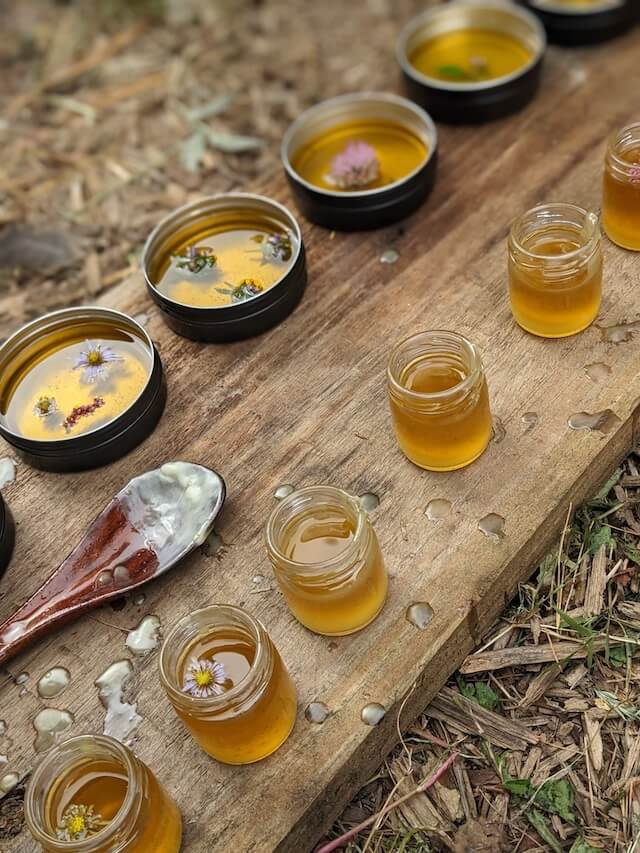Herbal medicine, also known as herbalism or folk medicine, involves using plants and fungi to improve and maintain health. Unlike conventional medication, which typically relies on synthetic chemicals, herbal medicine uses naturally occurring plant compounds to heal the body and mind. Today, herbal medicine is growing in popularity as more and more people look to natural alternatives to prescription drugs.
In this blog post, we’ll share an overview of herbal medicine and list some advantages of using herbs. To give you a complete picture, we’ll also discuss some of the disadvantages of herbal medicine.
What is herbal medicine?
According to the World Health Organization, herbal medicine is a branch of traditional medicine that’s defined as “the knowledge, skills and practices based on the theories, beliefs and experiences indigenous to different cultures, used in the maintenance of health and in the prevention, diagnosis, improvement or treatment of physical and mental illness.” In other words, Indigenous peoples and cultures worldwide have practiced herbal medicine for centuries to treat and prevent illness and continue to practice it to this day. Amazingly, it is estimated that approximately 80% of the population in developing countries uses traditional herbal medicines as part of their primary healthcare routine (Source).
Herbal medicine is a holistic approach to healthcare that integrates one’s mental, physical, emotional, and spiritual systems. Through herbalism, you aim to support the body’s natural healing processes rather than simply suppress disease symptoms. In fact, treating the root cause of illness can produce long-term health benefits and increase vitality. More specifically, herbal medicine involves using various parts of plants – such as leaves, roots, flowers, and stems – and mushrooms to create medicinal preparations. These preparations can include teas, tinctures, salves, oils, and more. Indeed, there are numerous benefits of herbal medicine, which we dive into below.
What Is Herbal Medicine Used For?
Herbal medicine is used to treat a broad spectrum of health conditions, promote wellness, and support the body’s natural healing systems. Common uses include managing stress and anxiety, easing digestive issues, relieving inflammation and chronic pain, balancing hormones, and improving immune resilience. Herbalists also turn to herbs for skin care, respiratory support, and even cognitive enhancement. For example, echinacea and elderberry are frequently used for immune boosting, while licorice root and slippery elm are prized for their soothing effects on the digestive tract.
In addition to treating acute conditions, many people use herbal medicine as part of a preventive approach to long-term health. This might involve daily tonics like nettle or tulsi tea, tinctures to support sleep and mental clarity, or incorporating herbs into cooking and wellness rituals. Herbalism doesn’t just address physical symptoms—it’s often used to support mental and emotional health, spiritual connection, and a deeper relationship with the natural world. Whether in the form of teas, capsules, salves, or infused oils, herbs offer time-tested support for a wide range of modern health challenges.
Benefits of herbal medicine
The advantages of herbal medicine are wide-ranging, from improved physical health to emotional well-being. These benefits of natural remedies can offer effective, plant-based support for common concerns like stress, digestion, and immune health.
More affordable
Prescription drugs can be costly, with average new cancer drugs costing anywhere from $6,000 to $15,000 monthly. On the other hand, herbal medicines can be quite affordable. You can often grow or forage the plants yourself. Additionally, even if you purchase herbal medicines over the counter, they are generally less expensive than prescription drugs.
Improved immune function
Herbal medicine can help improve immune function, which is essential for maintaining overall health. That’s because many herbs contain compounds that can balance our immune response, helping to prevent illness and improve the body’s ability to recover from injury or disease. Various wild mushrooms, including oyster, reishi, and chaga, are studied and used for their immune-boosting properties.
Better digestive health
Herbal medicine can also be beneficial for improving gut health. Indeed, herbs that contain anti-inflammatory compounds can help soothe inflammation and irritation in the digestive system. They can also assist with digestion and nutrient absorption from foods. Some herbs, like peppermint and ginger, are also beneficial for relieving nausea. And mucilaginous herbs, including dandelion, echinacea, and burdock, support the intestinal system by eliminating toxins.
Reduced stress and anxiety
Many herbs are adaptogens, meaning they are considered to effectively reduce stress by working to reduce the body’s cortisol levels. These include chamomile, lavender, and St. John’s Wort, which have natural calming properties. Adaptogenic herbs can help improve sleep, reduce anxiety and depression, and improve overall mood.
Enhanced cognition
Are you familiar with nootropic herbs? The brain loves them! Nootropic herbs can improve memory, reduce brain fog, and sharpen focus. Some of our favorites include ashwagandha and lion’s mane mushrooms.
Balanced hormones
One of the lesser-known benefits of herbal medicine is its ability to support hormonal balance, especially in those impacted by modern environmental toxins. Understanding what herbal medicine is used for in this context can empower individuals to take control of their health through plant-based practices.
In our modern world, the endocrine-disrupting chemicals found in plastics, cosmetics, household cleaners, and more are nearly impossible to avoid. These are linked to hormone imbalances and can cause serious diseases, including cancer. Hormone imbalances are also particularly troublesome for women, causing irregular menstrual cycles, fertility challenges, and menopausal symptoms. Therefore, limiting your exposure to endocrine disruptors and supplementing with hormone-balancing herbs, like black cohosh and wild yam, can help support your endocrine health.
Natural pain management
Pain is primarily caused by inflammation, and herbs with anti-inflammatory and antioxidant properties can be a natural alternative to conventional pain relief medications. These compounds can help reduce inflammation and alleviate pain without the risk of addiction or other harmful side effects associated with many over-the-counter and prescription pain medications.
Sustainable and eco-friendly
Another one of the advantages of using herbs is that they can be naturally grown and ethically wildcrafted (harvested), unlike chemically-produced conventional medicine. Ethical harvesting of plants involves taking only what’s needed, avoiding over-harvesting, and respecting the plant and its environment. By ethically foraging and preparing your own herbal medicines, you’re protecting biodiversity and promoting conservation for the well-being of the plants and the ecosystem.
Take plantain, for example. Plantain is a common “weed” and popular remedy for skin conditions such as wounds, burns, and insect bites that you can ethically harvest from your own backyard or garden.
Medicinal Herbal Recipes to Try
If you’re looking to get started with herbal medicine recipes, consider a few of these beginner-friendly ideas: a calming chamomile and lavender tea, a dandelion root tincture for digestion, or a yarrow salve for skin healing. These kinds of preparations allow you to explore herbal medicinal recipes that support your body and connect you with traditional plant-based practices.
Check out the video below to learn more about how to use plantain as herbal medicine.
Earth connection
Making your own herbal medicine can be a powerful way to connect with the Earth. Undoubtedly, you can gain a deep understanding and appreciation for the natural world by foraging, growing, harvesting, and processing medicinal herbs. Learning to identify the plants, their properties, and their ecosystems, can help you become more attuned to the cycles of the Earth and the interconnectedness of all living things.
Autonomy
By making your own herbal remedies, you can gain a sense of self-sufficiency that is deeply empowering. And if you want to play a more active role in your healthcare, establishing a wellness practice with herbal medicine is an excellent way. In our Wildcrafting and Medicine Making Intensive, you can learn how to identify, harvest, prepare, and use medicinal plants yourself!
Disadvantages of herbal medicine
We can’t talk about the advantages of herbs without also reviewing some of their disadvantages. While herbal medicine can be a natural alternative to conventional medicine, it’s not without its drawbacks.
Inconsistency
While some herbs are effective in treating certain conditions, many have yet to be studied extensively, and their effectiveness may be unknown. In addition, the potency of herbal remedies can vary depending on the quality of the plant, its growing conditions, and how it was processed. This can impact the dosage recommendations of certain herbal protocols.
There are some potential risks
Unfortunately, the potential for health risks is one of the disadvantages of herbal medicine. That’s because some herbal medicines can cause allergic reactions or interact with certain prescription drugs. In fact, some herbs, like pokeweed, can be toxic if not prepared correctly. Many herbs may also be harmful to pregnant or breastfeeding women.
Luckily, tools like the Memorial Sloan-Kittering Cancer Center Integrative Medicine Database make it easy to research the safety and efficacy of many herbs and mushrooms. It’s also essential to consult your healthcare provider before using herbal medicine, especially if you take prescription medication.
It’s important to note that synthetic medicines can be dangerous, too, and the risks of herbal medicine are often much less than those of drugs.
Contamination
Mass-produced medicinal herbs are susceptible to contamination, which can negatively impact human health. Herbal medicine can become contaminated by several sources, including pesticides, heavy metals, bacteria, and environmental pollution. It’s crucial to ensure that herbs are grown and processed safely and hygienically to prevent contamination.
Recommended Herbal Medicine Books
If you’re ready to learn more, here are some of the best herbal medicine books we recommend for all experience levels:
- “The Herbal Medicine-Maker’s Handbook” by James Green – A practical, hands-on guide with humor and personality.
- “Medical Herbalism” by David Hoffmann – A thorough and scientific resource for those wanting deep knowledge.
- “Herbal Recipes for Vibrant Health” by Rosemary Gladstar – An excellent entry-level guide with approachable, effective remedies.
These books on herbal medicine are rich with insights and recipes, whether you’re just starting out or looking to deepen your knowledge.
Frequently Asked Questions About Herbal Medicine
Can I grow my own herbal medicine at home?
Absolutely. Many medicinal herbs like mint, lemon balm, calendula, and chamomile grow well in home gardens or containers. With a little knowledge and care, you can cultivate a variety of herbs to make your own teas, salves, and tinctures.
What forms does herbal medicine come in?
Herbal remedies can be made into teas, tinctures, capsules, salves, oils, syrups, powders, and poultices. Each form has its own benefits and use cases, depending on the condition being treated and the herb used.
How do I know which herbs are safe to use?
Start by researching herbs using trusted databases, reading well-reviewed books, or taking an herbalism course. Look for information on dosage, contraindications, and potential interactions with medications. When in doubt, consult a trained herbalist or naturopathic doctor.
Are there risks or side effects with herbal medicine?
Yes. Some herbs can interact with medications, cause allergic reactions, or be harmful in high doses. It’s always important to research herbs thoroughly, consult a qualified herbalist, and use trusted sources like the Memorial Sloan-Kettering Integrative Medicine Database.
How do I start using herbal remedies safely?
Begin by learning about a few well-known herbs and how they are used. Start with gentle preparations like teas or salves, and explore a guided course like our Wildcrafting and Medicine Making Intensive for hands-on learning.
Herbal medicine is an important healing modality
In conclusion, there are numerous benefits and disadvantages of herbal medicine. Remember: medicinal herbs should be used under the guidance of a qualified healthcare professional or herbalist to ensure safety and effectiveness. By harnessing the power of fungi and plants, we can connect to the Earth to support our bodies in their natural healing processes and address various health conditions holistically and naturally.
If you’re excited to deepen your knowledge of medicinal herbal plants, explore the hands-on Wildcrafting & Medicine Making Class. You’ll gain practical experience with herbal medicine recipes, harvesting techniques, and the benefits of natural remedies.





